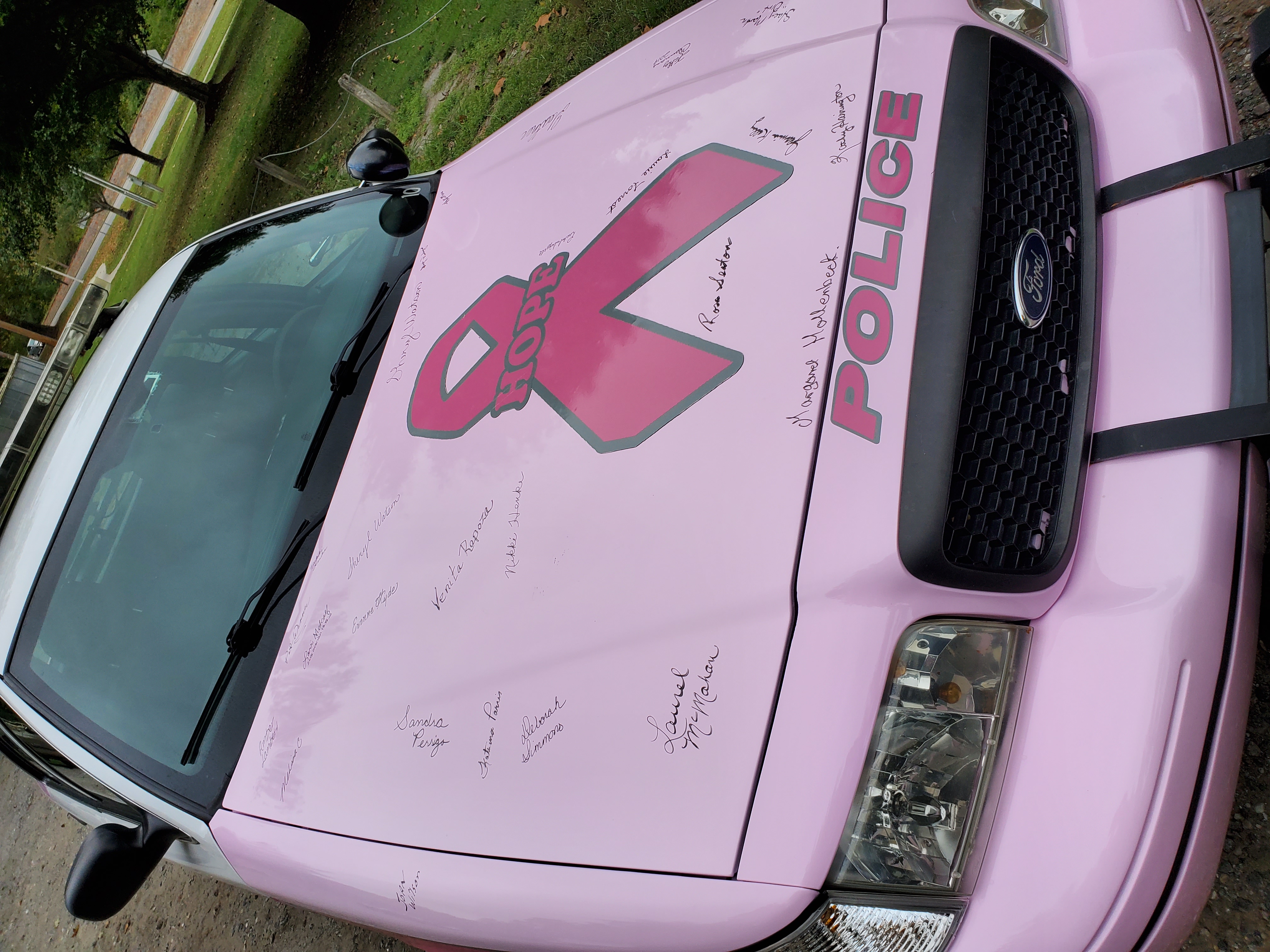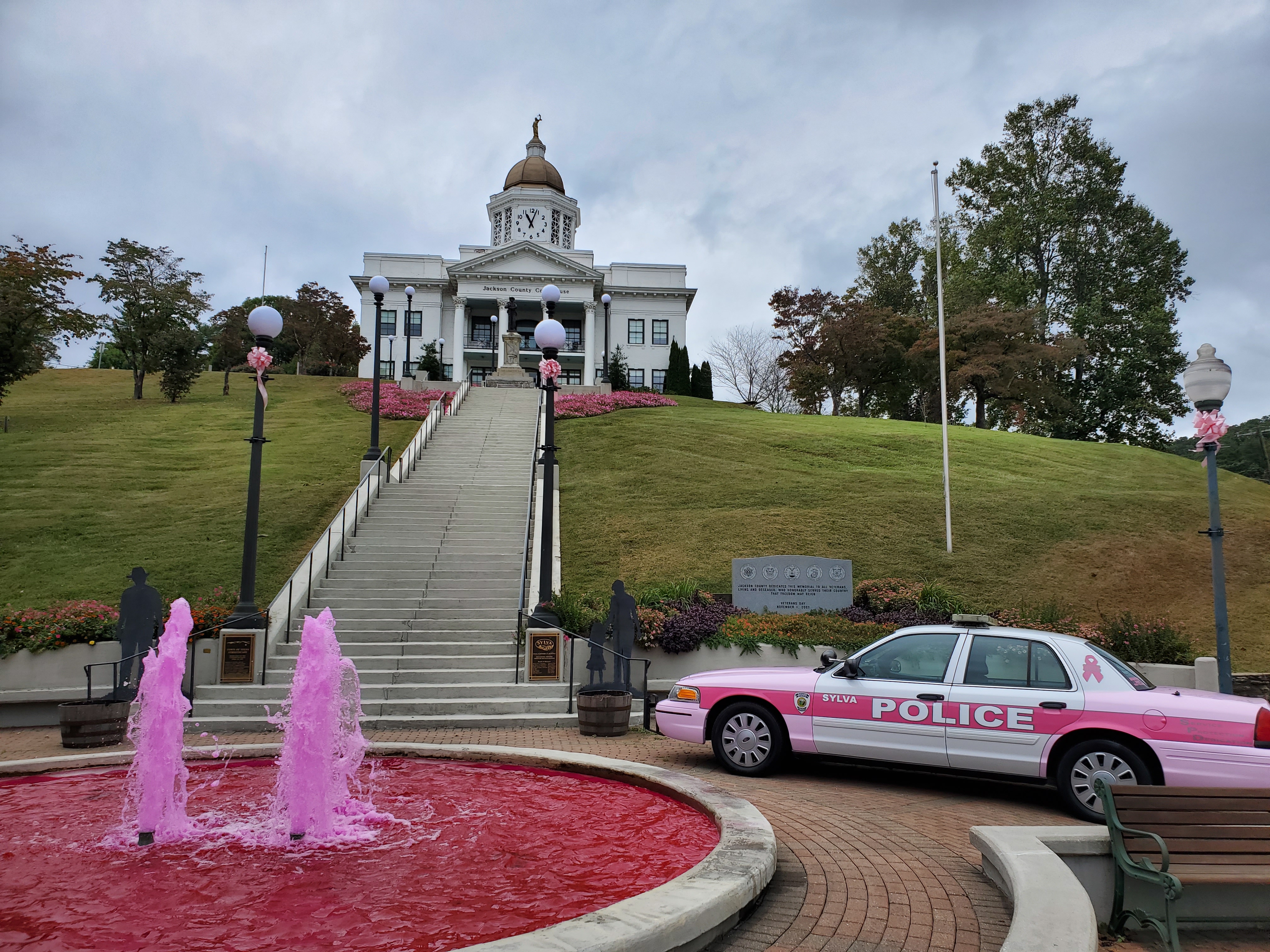Contact Us
To provide feedback on the Community Policing Dispatch, e-mail the editorial board at CPDispatch@usdoj.gov.
To obtain details on COPS Office programs, publications, and resources, contact the COPS Office Response Center at 800-421-6770 or AskCopsRC@usdoj.gov

U.S. Department of Justice
Office of Community Oriented Policing Services
Washington, DC 20530
The October 2022 winner of the COPS Office Photo Contest is the Sylva (North Carolina) Police Department (SPD). The Annual Walk for Hope, a breast cancer awareness event, brings out the SPD’s finest in pink every October. For Chief Chris Hatton, it’s a special opportunity to meet new people, hug old friends such as Margaret Hollenbeck (pictured with Hatton in the winning image), and keep the SPD’s community relations strong.
After exchanging compliments about their attire, Margaret asked for a selfie with Chief Hatton, who happily obliged. At some point during the walk around the charming small town of Sylva, she also got to add her signature to the department’s pink squad car.

Said Hatton, “The car’s name is HOPE, and we keep it out for several weeks in October, which is Breast Cancer Awareness month, parked by the town’s fountain, which spouts pink water the day of the event. Breast cancer survivors celebrate by signing their names on the pink car with the sharpies we have on hand.”
 The car is a former SPD patrol vehicle, which is kept garaged when not on display. However, Hatton recalls having to answer a call in it one day while driving the car to the garage. A few community businesses came together to supply and apply the pink paint and decals.
The car is a former SPD patrol vehicle, which is kept garaged when not on display. However, Hatton recalls having to answer a call in it one day while driving the car to the garage. A few community businesses came together to supply and apply the pink paint and decals.
This was the fifth Walk for Hope the SPD has sponsored, and Hatton says that in addition to drawing about 40 walkers, the event is supported by many local groups and organizations, including merchants who provide souvenir items for the department to give out.
This doesn’t surprise Hatton, who says Sylva is “kind of like Mayberry,” the perfect fictional town portrayed on The Andy Griffith Show—a small town where everybody knows each other and there’s a strong sense of community. Of Sylva’s appearance, Hatton added, “It looks like a town you’d see in a Lifetime movie,” describing Sylva’s few square miles of quaint buildings nestled in the valley below Mount Balsam. The town’s centerpiece is a big, beautiful old courthouse up on the hill at the end of Main Street.
 In addition to its picturesque Main Street and scenic hiking trails, Sylva offers another attraction that draws tourists: four local breweries, which produce more than 120 craft ales which visitors can enjoy on “beer walks.”
In addition to its picturesque Main Street and scenic hiking trails, Sylva offers another attraction that draws tourists: four local breweries, which produce more than 120 craft ales which visitors can enjoy on “beer walks.”
Asked if this creates problems, Hatton says the brewery crowd is different from the traditional bar crowd, far less likely to erupt in fights. “Besides, it’s a small town and our locals tend to police themselves fairly well. We have a lot of community support in keeping our town safe,” said Hatton.
This support is demonstrated by two programs in which local people help the SPD maintain the high quality of life the town is known for.
VIPS Augment SPD’s Staff for Events
One of these is a program called VIPS, or Volunteers in Public Service, which the SPD developed to fill the need for extra hands during large events.
These volunteers reroute traffic around an accident or event and assist in other tasks, using skills from a variety of backgrounds. They include criminal justice students at Western Carolina University (WCU), business owners, and teachers. But one of the most popular sources for volunteers are retirees.
Said Hatton, “It’s a population that’s often ignored, and quite a few have settled around Sylva. So, when I hear about a retiree who’s moved here, I call and say, ‘We could use your help and if you can pitch in from time to time, we would love it.’
“When I heard a retired law enforcement couple from Miami had relocated here, for instance, I reached out and asked if they wanted to plug in with SPD. They said they wanted to be useful in retirement, and the wife is now head of our VIPS program.”
Community Care Adds Services for Residents in Need
Another successful volunteer effort is the Community Care Program, in which SPD collaborates with WCU to engage a student intern from their social work graduate program to serve as the department’s community care liaison.
 The intern’s primary functions are to follow up with citizens involved in police calls for service and to connect victims with community resources. This individual is trained in responding to a variety of different scenarios and has contacts with services for the unhoused, veterans, individuals with behavioral health issues, and other needs.
The intern’s primary functions are to follow up with citizens involved in police calls for service and to connect victims with community resources. This individual is trained in responding to a variety of different scenarios and has contacts with services for the unhoused, veterans, individuals with behavioral health issues, and other needs.
Said Hatton, “Even though we are a small town, we’re busy. Our population is 2,800, but we have over 30,000 cars a day in our little town. We get more calls than we have officers to respond to at times, and they sometimes meet people who need special attention. But officers may not have the specific training for a particular health situation, or the time to attend to ongoing needs.
“This program is a winner for everybody. The student gets hands-on experience; the department provides better service; officers learn about mental health issues; the person in need gets good care; and the community gets an important service.”
What’s more, these two programs are valuable force multipliers, allowing the SPD’s 15 sworn officers to concentrate on police work. “Before these programs, we had to pay officers overtime on their days off or pay other agencies to help out,” Hatton says.
Asked if attracting and keeping officers in this small, rural town has been a challenge, he said “We were really short-handed for a while. So, realizing that what we were doing to recruit wasn’t working, we made some changes.”
A People-Centered Approach to Recruiting and Policing
“Our new process is people-centered,” Hatton explained. “Rather than asking for all the official documents and the formalities up front, we try to get to know the person first, by meeting for coffee and some real conversation with the applicant and their spouse.
“I try to determine if this individual has a good character, and if they would be happy following our people-centered philosophy of policing. You can teach people to be good police officers, but not how to be a good person.
“I also tell them all about our department, the negatives as well as the positives. I say, for instance, that we don’t have a SWAT team. So, if you want that, we’re not the best place for you. This is also true if you’re looking for the tough-guy approach to policing.
“At the same time, we make sure that applicants know that, while we have a high standard for behavior and performance, we really care about our officers and provide a supportive work environment.”
Hatton says this people-centered approach has proven to be highly successful. “We’ve found that lots of officers are searching for a department with our philosophy and we’re now fully staffed, with a couple of additional candidates ready to start when there is an opening.”
Summing up the SPD’s approach to policing, Hatton said, “While handcuffs and citations have their place in our profession, we believe that policing is more than that. We never sacrifice our principles. [The] SPD is committed to getting the job of law enforcement done and taking good care of people at every opportunity. We strive to provide the best possible customer service, even when tough situations make that difficult.
“We are truly a community policing agency. We really do care about the people of Sylva and work to make it show in everything we do,” he added, voicing a commitment demonstrated year-round but seen most colorfully every October with a pink car and a Walk for Hope.
Photos courtesy of the Sylva (NC) Police Department.
Subscribe to Email Updates
To sign up for monthly updates or to access your subscriber preferences, please enter your email address in the Subscribe box.






